|
|
|
Sort Order |
|
|
|
Items / Page
|
|
|
|
|
|
|
| Srl | Item |
| 1 |
ID:
175122
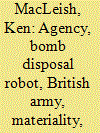

|
|
|
|
|
| Summary/Abstract |
This article posits an analytic of mobilization–demobilization that attends to the instrumentalization and fungibility of military lives as both a primary source of embodied war-related harm and an undertheorized logic of the US war-making apparatus. Based on ethnographic fieldwork among post-9/11 military veterans in a US military community, the article explores mobilization–demobilization across three registers. First, I contrast it with dominant scholarly framings of ‘transition’, ‘reintegration’, and ‘militarization’, terms that analytically compartmentalize war in space and time. Second, I show how mobilization–demobilization drives the uptake and release of military labor and accounts for continuities between war violence and ‘war-like’ domestic political relations in 20th- and 21st-century US military recruiting, welfare, and personnel practices. Finally, I describe the trajectory of one veteran caught up in some elements of mobilization–demobilization, including injury, post-traumatic stress, substance use, and law-breaking, which are structured by the military’s management of his labor. These dynamics demonstrate crucial empirical links between the domestic and global faces of US war-making, and between war and nominally non-war domains.
|
|
|
|
|
|
|
|
|
|
|
|
|
|
|
|
| 2 |
ID:
107801
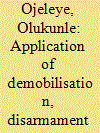

|
|
|
|
|
| Publication |
2011.
|
| Summary/Abstract |
The oil- and gas-rich Niger Delta region, plagued by violence and dominated by armed militant gangs, typifies the new face of conflict which second generation demobilisation, disarmament and reintegration (DDR) approaches are meant to address at the sub-national level. Fundamental to the emergence of militant gangs and the militarisation of civil society in Nigeria is the federal system of government and its attendant political, social and economic imbalances. This article advances the argument that the implementation of a detailed DDR programme that addresses the governance, ethnic politics, resource control, revenue distribution and national integration issues at the root of the tensions in the troubled oil- and gas-rich region will yield a greater peace dividend for all stakeholders in contrast to the current amnesty programme of the Nigerian government. This programme has been fraught with setbacks and mistrust from its client group (the militants). In so doing, DDR at the sub-national level in the Niger Delta would serve as a tool to achieve peace and long-term stability in the nation not only by removing the tools of violence - weapons and ammunition - from the militants and the civilian population but also by removing the sources of violence as reflected in socio-economic and political inequality within the Nigerian state.
|
|
|
|
|
|
|
|
|
|
|
|
|
|
|
|
| 3 |
ID:
101813
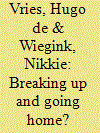

|
|
|
|
|
| Publication |
2011.
|
| Summary/Abstract |
This article argues that the common assumptions that lie behind efforts to break the command and control structures of armed groups, and working on 'community reintegration', are not necessary prerequisites for a successful disarmament, demobilization and reintegration (DDR) process. Former fighters may encounter troubles going home, as their communities of origin may not be as open to them as is often assumed. They may also have no other choice than to keep their military structures intact. However, this may not necessarily impede their social integration. In fact, the structures emerging from war may be relatively constructive for the socio-economic rehabilitation of former fighters.
|
|
|
|
|
|
|
|
|
|
|
|
|
|
|
|
| 4 |
ID:
171985


|
|
|
|
|
| Summary/Abstract |
The disarmament, demobilization, and reintegration of ex-combatants has become an integral part of peacebuilding. Although the main purpose of such interventions is to dissolve the military structures of armed groups, there is growing evidence that ex-combatant networks often remain intact. We investigate why such structures continue to thrive. We argue that ex-military networks are stronger when ex-commanders have weak links to elite patronage systems. Ex-combatants who are unable to rely on their former superiors for economic assistance must instead build denser ties to each other to gain access to a social safety net. To assess our argument, we conduct a comparative social network analysis (SNA) of two ex-military networks in Liberia. This innovative approach helps us uncover previously overlooked, but central, dynamics related to ex-combatant groups. We thereby show that SNA provides a range of underutilized tools and exact definitions that can increase our understanding of ex-military networks.
|
|
|
|
|
|
|
|
|
|
|
|
|
|
|
|
| 5 |
ID:
098266
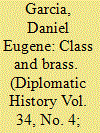

|
|
|
| 6 |
ID:
082510
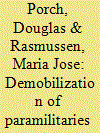

|
|
|
|
|
| Publication |
2008.
|
| Summary/Abstract |
Historically, Disarmament, Demobilization, and Reinsertion (DDR) has provided a useful means to terminate conflicts. Since being catapulted to office in August 2002 with 53 percent of the vote of 46.45 percent of the voters,1 Colombian Presidentlvaro Uribe has vigorously pursued a demobilization program, both individual and collective. However, despite the fact that over 40,000 combatants have demobilized under these programs, evidence is growing that this latest round of Colombian DDR is merely transitioning, rather than terminating, violence in that Andean country.
|
|
|
|
|
|
|
|
|
|
|
|
|
|
|
|
| 7 |
ID:
153528
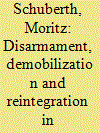

|
|
|
|
|
| Summary/Abstract |
Disarmament, demobilization and reintegration (DDR) programmes form part of standard post-conflict peacebuilding tools regularly applied in the context of UN peacekeeping operations. Yet, the limitations of such templates become evident when peacebuilders are confronted with unconventional settings, such as the urban environment. So far, there is a scarcity of research on UN-led DDR efforts in cities, even though the proliferation of urban armed groups is projected to pose an intractable challenge for decades to come. Based on six months of fieldwork in Port-au-Prince, this article presents new empirical evidence on innovative DDR programming in Haiti, the only country where a United Nations Stabilization Mission (MINUSTAH) tried to implement a traditional DDR programme for gang members. As this attempt proved to be a failure, the mission subsequently changed its approach to a more community-focused armed violence reduction and prevention programme which aims to disincentivize at-risk sections of the population from joining gangs. Even though the current community violence reduction approach is better adapted to the unconventional conflict environment in Haiti and is seen by many practitioners today as a role model, it shares a number of limitations with traditional DDR programmes and is not a panacea for urban peacebuilding.
|
|
|
|
|
|
|
|
|
|
|
|
|
|
|
|
| 8 |
ID:
152951
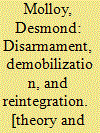

|
|
|
|
|
| Publication |
Colorado, Kumarian Press, 2017.
|
| Description |
vii, 255p.pbk
|
| Standard Number |
9781626375680
|
|
|
|
|
|
|
|
|
|
|
|
Copies: C:1/I:0,R:0,Q:0
Circulation
| Accession# | Call# | Current Location | Status | Policy | Location |
| 059061 | 327.1/MOL 059061 | Main | On Shelf | General | |
|
|
|
|
| 9 |
ID:
089476
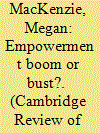

|
|
|
|
|
| Publication |
2009.
|
| Summary/Abstract |
Over the past decade, the term 'empowerment' has been generously employed and woefully ill-defined. In particular, women's empowerment has been embraced by such a vast number of development actors that it appears to be a unifying mission within development. Despite the boom in women's empowerment initiatives, there remains little critical analysis of the use of empowerment in general, and the perceived success or failures of specific empowerment initiatives. Using the disarmament, demobilization and reintegration process in Sierra Leone as a case study, this paper examines how reintegration was described as a source of empowerment for women. Drawing from interviews and analysis of related policy discourses, it is argued that, rather than representing a radical shift in development approaches towards more inclusive and representative policies, empowerment projects are shaped by neoliberal ideas such as individualism, responsibility and economic order and carry implicit, gendered and disciplining messages about appropriate social behaviour.
|
|
|
|
|
|
|
|
|
|
|
|
|
|
|
|
| 10 |
ID:
144237
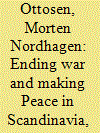

|
|
|
|
|
| Summary/Abstract |
The Napoleonic wars had a tremendous impact on the Scandinavian countries. Political and social upheaval and economic disruption ensured that ending war was no straightforward or rapid process. For traumatized veterans and those who had lost a husband or father, war never quite ended, to say nothing of those who remained under military occupation even after the nominal conclusion of peace. Still, the parallel process of making peace after 1815 was quite remarkable in Scandinavia, as 300 years of bitter rivalry, enmity, and perpetual conflict rapidly gave way to reconciliation to a point where Scandinavian union was a more likely outcome than a future Scandinavian war.
|
|
|
|
|
|
|
|
|
|
|
|
|
|
|
|
| 11 |
ID:
113105
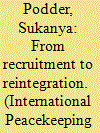

|
|
|
|
|
| Publication |
2012.
|
| Summary/Abstract |
In disarmament, demobilization and reintegration (DDR) programmes, return to home communities is a normative given, around which reinsertion and reintegration support is planned. Yet such an approach is oblivious of pre-war social dynamics of rebel recruitment and civilian experiences of rebel abuse and coercion. These manifest as important sources of social tension between communities and combatants in the post-war period and complicate reintegration. This research shows that the 'recruitment-reintegration' nexus offers a key variable for explaining tensions between civilian communities and ex-combatants in post-conflict Liberia, and could be leveraged in future efforts to improve DDR programmes.
|
|
|
|
|
|
|
|
|
|
|
|
|
|
|
|
| 12 |
ID:
159143
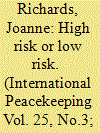

|
|
|
|
|
| Summary/Abstract |
Programmes of disarmament, demobilization, and reintegration (DDR) are increasingly implemented in contexts of violent extremist conflict. In such settings, DDR practitioners may need to distinguish between ex-combatants who can be safely reintegrated into civilian life, and ex-combatants who are likely to present a danger to the community in terms of violent and/or extremist re-offending. To help practitioners make this assessment, this paper explores how risk assessment tools used by psychologists in criminal justice settings may be adapted to screen for violent extremist offenders in DDR programmes. The findings suggest that the method of structured professional judgment (SPJ) can be used to assess the risk that individual ex-combatants will re-offend upon return to civilian life. By extension, SPJ can also: (1) help practitioners to understand what type of deradicalization and disengagement programming former members of extremist groups may require and (2) contribute to decisions concerning the release of ex-combatants from prisons and transitional DDR centres.
|
|
|
|
|
|
|
|
|
|
|
|
|
|
|
|
| 13 |
ID:
092248
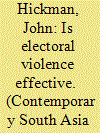

|
|
|
|
|
| Publication |
2009.
|
| Summary/Abstract |
This research note reports empirical findings from a study of the effectiveness of electoral violence and intimidation in Sri Lanka's 2005 presidential election. Using the previous 1999 presidential election as a baseline for comparison, analysis conducted at the polling division level reveals that both United National Party (UNP) candidate Ranil Wickramasinghe and United People's Freedom Alliance (UPFP) candidate Mahinda Rajapakse experienced declines in the percentage of votes in polling divisions where opponent party activists committed acts of violence or intimidation. Fewer polling divisions reported violence or intimidation by UNP than UPFP activists, but the former appear to have been more effective in demobilizing voters.
|
|
|
|
|
|
|
|
|
|
|
|
|
|
|
|
| 14 |
ID:
138306


|
|
|
|
|
| Summary/Abstract |
How and why do regime type and interstate war affect government spending? We argue that a political leader allocates scarce resources between social and military expenditures as a function of their relative efficiency in securing her political survival. We derive four hypotheses concerning how mobilization for and demobilization from interstate war affects government spending differently in democratic and autocratic regimes. Compared to democracies, autocracies should increase military spending to a greater degree during wartime and decrease military spending to a greater extent following a war. Autocracies also should cut social spending more during an interstate war and increase social spending more during the process of demobilization from war than democracies. Our analyses of all states in the international system from 1950 to 2001 yield support for our hypotheses.
|
|
|
|
|
|
|
|
|
|
|
|
|
|
|
|
| 15 |
ID:
085012
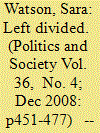

|
|
|
|
|
| Publication |
2008.
|
| Summary/Abstract |
This article challenges dominant explanations in the comparative political economy literature on the origins and purposes of social protection. Far from being a tool of working-class mobilization, social protection in southern Spain was strategically employed by a left party to politically demobilize its supposedly "natural" constituencies. This peculiar outcome is the result of a setting that is common in welfare states outside of northern Europe: the context of a divided left, in which parties and unions are seeking to mobilize different constituencies and in which left parties are themselves divided between moderate and far-left groups. The result in Spain was that social policy became a weapon in parties' efforts to undermine their political competition. This suggests the need to rethink the received wisdom about what the welfare state does to build working-class power in the context of a divided left
|
|
|
|
|
|
|
|
|
|
|
|
|
|
|
|
| 16 |
ID:
140778
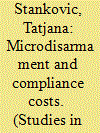

|
|
|
|
|
| Summary/Abstract |
Focusing on disarmament, demobilization, and reintegration programs, this article considers why some armed groups disarm and demobilize, while others refuse to do so. Previous research focused on intergroup rivalries and identified enforcement as a critical barrier. This study considers the effect of (1) war benefits and (2) intragroup dynamics and argues that distribution problems obstruct conflict resolution. Using a simple game-theoretic model, the article demonstrates that optimal programs (1) consider that combatants' cost of supporting peace varies and (2) require a mix of positive and negative incentives to motivate all ex-combatants to participate and comply with program requirements.
|
|
|
|
|
|
|
|
|
|
|
|
|
|
|
|
| 17 |
ID:
159490
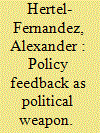

|
|
|
|
|
| Summary/Abstract |
Scholars have shown that once in place policies can foster greater political participation. Indeed, politicians often deliberately design policies to shore up political support among their allies. But can political actors engineer the reverse effect, crafting policies that demobilize their rivals? Drawing on the example of conservative cross-state advocacy against public sector unions, I describe the strategy of policy feedback as political weapon, or when actors design policies to politically weaken their opponents. I then document that the passage of conservative network-backed legislation led to large and enduring declines in public sector union density and revenue. I further show that by curbing the power of public unions, the passage of conservative network-backed bills dampened the political participation of public sector employees. My findings emphasize the importance of considering how actors use policy to demobilize political opponents and explain why public unions are now on the defensive in state politics.
|
|
|
|
|
|
|
|
|
|
|
|
|
|
|
|
| 18 |
ID:
076498
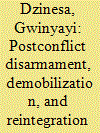

|
|
|
|
|
| Publication |
2007.
|
| Summary/Abstract |
Postconflict disarmament, demobilization, and reintegration (DDR) of former combatants in Angola, Mozambique, Namibia, South Africa, and Zimbabwe aimed at addressing problems of postconflict peace building. Differences among designs and designers of these subregional postconflict cases are well known. An overarching goal was the pursuit of peace and stability through the management of weapons and sustainable reintegration of ex-combatants. In all the different cases, DDR fell short of meeting this target with different impacts. Through an integrative focus sensitive to policy and context, this article draws on these shortcomings to contribute to this rapidly growing and internationally recognized important subfield of international relations.
|
|
|
|
|
|
|
|
|
|
|
|
|
|
|
|
| 19 |
ID:
158980
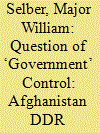

|
|
|
|
|
| Summary/Abstract |
Since the fall of the Taliban in late 2001, the Islamic Republic of Afghanistan (GIRoA), the United States, the United Nations, and the International Security Assistance Force (ISAF) have funded and led three different Disarmament, Demobilization, and Reintegration (DDR) programs. Despite a significant investment in time and treasure, all of them have failed to significantly reduce the number of insurgents or arbaki (militia). This article explores why these programs failed despite incorporating ideas from the prominent DDR schools of thought. Utilizing Stathis Kalyvas’ theory of The Logic of Violence in Civil War as a lens, this article argues that GIRoA and ISAF did not have sufficient control of territory to entice insurgents or arbaki to reconcile and/or reintegrate with the government. Further, in areas GIRoA nominally controlled in northern and western Afghanistan, regional powerbrokers who controlled these areas balked at these programs.
|
|
|
|
|
|
|
|
|
|
|
|
|
|
|
|
| 20 |
ID:
145486
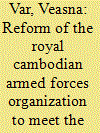

|
|
|
|
|
| Summary/Abstract |
Cambodia has recently recovered from decades of civil conflict, and remains one of the poorest countries in the region. The current political stability and peace in Cambodia has provided great opportunities for the Royal Government of Cambodia (RGC) to focus on national reconstruction and economic development. The Royal Cambodian Armed Forces (RCAF) is currently at a major crossroads with respect to reforming its forces, which contributes to the government’s grand strategy called the “Rectangular Strategy.” This strategy lists reform of the RCAF as one of the outcomes needed to achieve national strategic objectives. It states that the RGC is strongly committed to military reform with a goal of rebuilding the armed forces to an appropriate size and quality to be able to defend the country in wartime and peacetime. Although the RCAF has achieved its missions very satisfactorily, it faces significant challenges with respect to its reform programs. The purpose of this paper is to identify the major military reform challenges confronting the RCAF and examine the current policy being pursued by the RGC, and then it will propose policy framework options to address a range of current and increasing problems and challenges to RCAF reform.
|
|
|
|
|
|
|
|
|
|
|
|
|
|
|
|
|
|
|
|
|